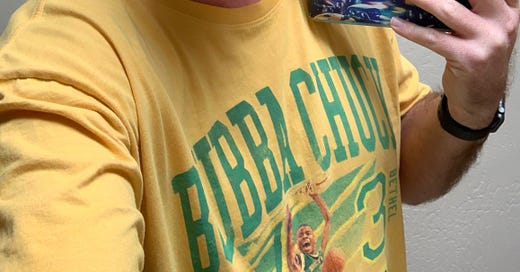The Press Break Book Review Corner: "The City Game"
A look at the 1950 national champion CCNY Beavers explores themes that resonate in 2021.
Among the more fascinating and — excuse me for being a bit puritanical — concerning developments in recent years has been the ubiquity of gambling woven into sports coverage.
To be clear, my personal views on the legality of sports betting mirror my thoughts on marijuana legalization: Both should be legalized at the federal level rather than the state-by-state trickle, but gambling access should be more akin to that of marijuana with highly specialized locations that follow strict, local codes.
Similarly, media entities have a responsibility to present gambling information in its own silo rather than as an unavoidable element of game coverage. The inundation of gambling content feels like the latest desperate Hail Mary of outlets who want quick-fix solutions to the industry’s monetary struggles, a la Pivot To Video.
However, the impact of gambling oversaturation could arguably be more grave than pivot to video in that the unprofessional way in which betting is covered promotes problem gambling. That’s a topic I want to delve into at greater length in the future.
Likewise, the subject of gambling’s current omnipresence and college sports is one that I have long wanted to tackle in-depth. I had actually pitched, and had accepted, a series of college basketball features reported from Las Vegas during Championship Week 2020, among them the tenuous balance between amateur sports and gambling media.
My suitcase was packed and I was ready to make the drive to Vegas when COVID-19 shut the world down. I still plan to pursue the topic some time soon, and feel more equipped to now that I’ve read Matthew Goodman’s excellent book The City Game: Triumph, Scandal and a Legendary Basketball Team (2019).
I finished reading The City Game in December, and cannot recommend it highly enough. It’s an easy pitch for readers of this newsletter: Odds are if you’re reading this, you’re already a basketball fan and thus would find a scandal that threatened the very existence of college basketball intriguing.
However, being plugged into college hoops isn’t a requisite for enjoying The City Game.
In my prior research, I read Charley Rosen’s The Scandals of ‘51; a worthwhile book but more targeted at a basketball-savvy audience and less detailed than The City Game. Rosen’s book touches on a variety of programs involved in the point-shaving scandals at Madison Square Garden that decimated the budding, national powerhouse programs at Long Island U. and City College of New York.
Goodman focuses exclusively on CCNY, which became the first program ever to win both the Postseason NIT and the NCAA Tournament in the same year in 1950. Goodman’s exhaustive research and interviews makes The City Game read like a firsthand, behind-the-scenes account of both CCNY’s triumph in ‘50, and the downfall in ‘51.
The City Game details motivations in an intimate way that, while not intended to exonerate players implicated in the vast point-shaving scandal, helps the reader understand why. And it’s discussion that remains relevant today, rooted in the still-prevalent debate about college amateurism.
College sports, basketball in particular, have a long and ugly history tied into gambling, from the MSG scandals of the early 1950s; to the Boston College fixing scandal of the late 1970s, perpetrated by Henry Hill’s gang and referenced in Goodfellas; to members of the 1990 UNLV national championship team being photographed with Richard “The Fixer” Perry; to the Arizona State point-shaving incident in the mid-1990s.
While The City Game covers a timeline well before billion-dollar TV contracts, the celebrity CCNY players achieved and the money changing hands around them while star guard Floyd Lane simply wanted to buy his mother new washing machine, resonates in modern context.
The City Game presents the CCNY scandal through the lens of how the college itself functioned as a project for the public good, offering free tuition and boosting the professional and social standing of its primarily Black and Jewish student body. This theme explores a still-relevant debate on the oftentimes tenuous relationship between high-profile sports and the academic mission on campuses.
Political posturing of post-WWII New York also play prominently into The City Game narrative in a manner that reflects modern times. The political tug-of-war afoot on sports betting legalization has made gambling less taboo feeling in the mainstream, but there’s also a Wild West aura to it. How do we regulate this massive industry, and what influences are pushing our decisionmakers on these topics?
Ultimately, The City Game is both a brilliantly researched historical perspective, and an insightful commentary on issues that exist today. Add it to your summer reading list.




